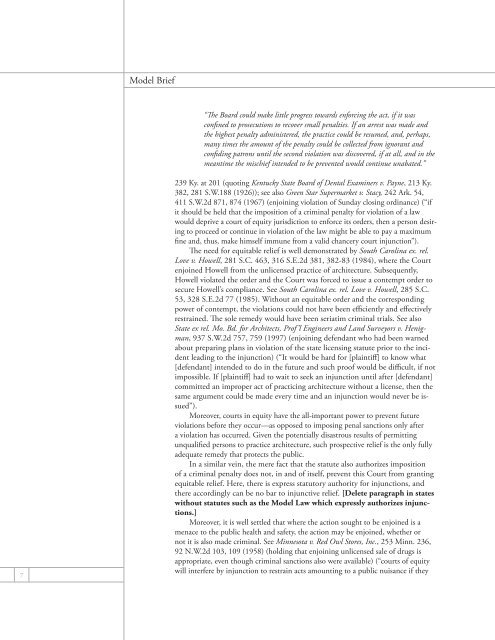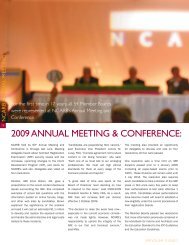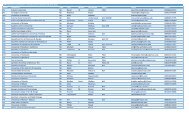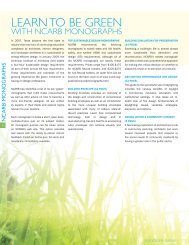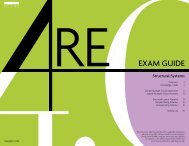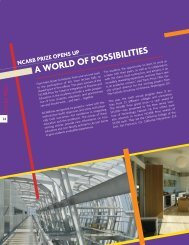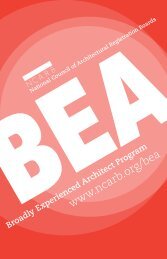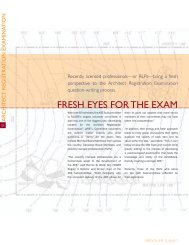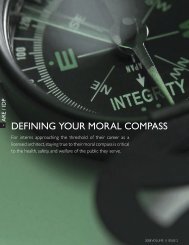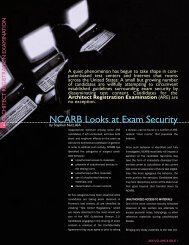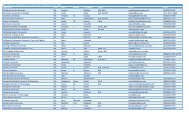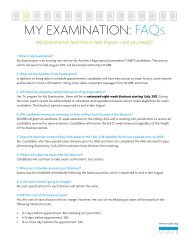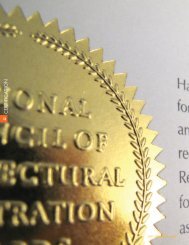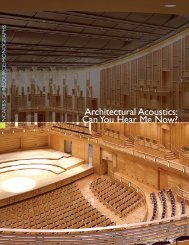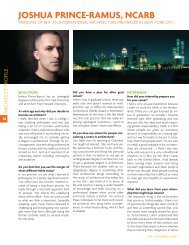Model Brief to Enforce Laws Prohibiting Architectural ... - NCARB
Model Brief to Enforce Laws Prohibiting Architectural ... - NCARB
Model Brief to Enforce Laws Prohibiting Architectural ... - NCARB
Create successful ePaper yourself
Turn your PDF publications into a flip-book with our unique Google optimized e-Paper software.
<strong>Model</strong> <strong>Brief</strong><br />
“The Board could make little progress <strong>to</strong>wards enforcing the act, if it was<br />
confined <strong>to</strong> prosecutions <strong>to</strong> recover small penalties. If an arrest was made and<br />
the highest penalty administered, the practice could be resumed, and, perhaps,<br />
many times the amount of the penalty could be collected from ignorant and<br />
confiding patrons until the second violation was discovered, if at all, and in the<br />
meantime the mischief intended <strong>to</strong> be prevented would continue unabated.”<br />
7<br />
239 Ky. at 201 (quoting Kentucky State Board of Dental Examiners v. Payne, 213 Ky.<br />
382, 281 S.W.188 (1926)); see also Green Star Supermarket v. Stacy, 242 Ark. 54,<br />
411 S.W.2d 871, 874 (1967) (enjoining violation of Sunday closing ordinance) (“if<br />
it should be held that the imposition of a criminal penalty for violation of a law<br />
would deprive a court of equity jurisdiction <strong>to</strong> enforce its orders, then a person desiring<br />
<strong>to</strong> proceed or continue in violation of the law might be able <strong>to</strong> pay a maximum<br />
fine and, thus, make himself immune from a valid chancery court injunction”).<br />
The need for equitable relief is well demonstrated by South Carolina ex. rel.<br />
Love v. Howell, 281 S.C. 463, 316 S.E.2d 381, 382-83 (1984), where the Court<br />
enjoined Howell from the unlicensed practice of architecture. Subsequently,<br />
Howell violated the order and the Court was forced <strong>to</strong> issue a contempt order <strong>to</strong><br />
secure Howell’s compliance. See South Carolina ex. rel. Love v. Howell, 285 S.C.<br />
53, 328 S.E.2d 77 (1985). Without an equitable order and the corresponding<br />
power of contempt, the violations could not have been efficiently and effectively<br />
restrained. The sole remedy would have been seriatim criminal trials. See also<br />
State ex rel. Mo. Bd. for Architects, Prof’l Engineers and Land Surveyors v. Henigman,<br />
937 S.W.2d 757, 759 (1997) (enjoining defendant who had been warned<br />
about preparing plans in violation of the state licensing statute prior <strong>to</strong> the incident<br />
leading <strong>to</strong> the injunction) (“It would be hard for [plaintiff] <strong>to</strong> know what<br />
[defendant] intended <strong>to</strong> do in the future and such proof would be difficult, if not<br />
impossible. If [plaintiff] had <strong>to</strong> wait <strong>to</strong> seek an injunction until after [defendant]<br />
committed an improper act of practicing architecture without a license, then the<br />
same argument could be made every time and an injunction would never be issued”).<br />
Moreover, courts in equity have the all-important power <strong>to</strong> prevent future<br />
violations before they occur—as opposed <strong>to</strong> imposing penal sanctions only after<br />
a violation has occurred. Given the potentially disastrous results of permitting<br />
unqualified persons <strong>to</strong> practice architecture, such prospective relief is the only fully<br />
adequate remedy that protects the public.<br />
In a similar vein, the mere fact that the statute also authorizes imposition<br />
of a criminal penalty does not, in and of itself, prevent this Court from granting<br />
equitable relief. Here, there is express statu<strong>to</strong>ry authority for injunctions, and<br />
there accordingly can be no bar <strong>to</strong> injunctive relief. [Delete paragraph in states<br />
without statutes such as the <strong>Model</strong> Law which expressly authorizes injunctions.]<br />
Moreover, it is well settled that where the action sought <strong>to</strong> be enjoined is a<br />
menace <strong>to</strong> the public health and safety, the action may be enjoined, whether or<br />
not it is also made criminal. See Minnesota v. Red Owl S<strong>to</strong>res, Inc., 253 Minn. 236,<br />
92 N.W.2d 103, 109 (1958) (holding that enjoining unlicensed sale of drugs is<br />
appropriate, even though criminal sanctions also were available) (“courts of equity<br />
will interfere by injunction <strong>to</strong> restrain acts amounting <strong>to</strong> a public nuisance if they


